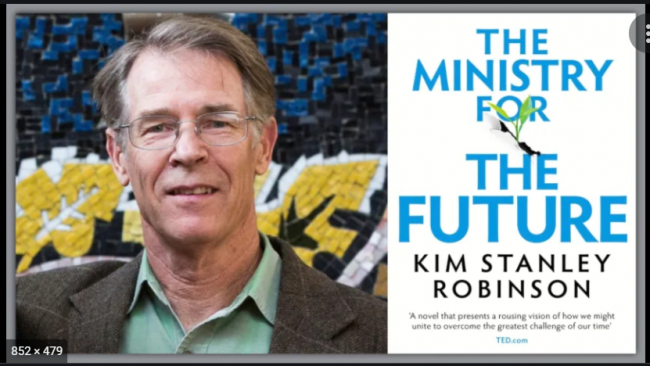Articles Menu


Ideas 53:59Kim Stanley Robinson: The Best-Case Scenario You Can Still Believe In
Listen here: https://www.cbc.ca/radio/ideas/lessons-from-science-fiction-on-how-to-fi...
In the summer of 2021, nearly 600 people died in British Columbia during a heat wave. In November 2021, rainfall from an atmospheric river battered the province.
Both real-world disasters are eerily reminiscent of events in the 2020 science fiction novel, The Ministry for the Future.
"This was an easy call to make. I am not any brilliant prophet and I don't believe in brilliant prophets," author Kim Stanley Robinson told IDEAS host Nahlah Ayed.
"This is going to keep happening. It's already been happening. So when I write it up, I would like to try to make it a slap in the face."
After its terrifying opening scene, which describes a mass casualty event from a heat wave, The Ministry for the Future goes on to imagine 30 years of sweeping political, economic and social change.
The novel explores how to get from the political gridlock of the 2020s to a more liveable future.
"In effect, this was a novel about the Paris Agreement, over the next 30 years, working to make a best-case scenario going forward that you could still believe in when you were done with the book," Robinson said in a recent lecture for the Possible Worlds series, [Editor: Here you can see/hear Robinson giving the whole speech and the questions and answers and it's worth it!! https://humanities.ucla.edu/lecture/possible-worlds/events/kim-stanley-robinson/] hosted by the Berggruen Institute and UCLA.
The lecture was delivered shortly after Robinson returned from COP26 in Glasgow. He spoke with Nahlah Ayed about what creates large-scale change, the relationship between fiction and reality, and what he learned about power and the coming political battles over decarbonization at COP26.
Here are some excerpts from their conversation.
NA: In your opening chapter of the Ministry for the Future, you described a deadly heat wave where 20 million people die. Why was it important to you to start your 'history of the future' with this particular heat wave?
KSR: I am terrified that it could happen in the next few years. We're trembling on the brink of something like that happening — this wet-bulb 35, which is a heat index, so it has to be heat and humidity.
What happened in western Canada this year, the incredible heat wave that was so far off the charts of climatological probability that it's almost inconceivable how it happened, but it did — now we know we're in this zone. If that heat was combined with high humidity, then anybody who wasn't in air conditioning would be killed by it within hours. Dry heat is a little easier to sustain, although lots of people died anyway.
So when I became aware of that, which is around 2017 and the scientific community was trying to spread the word on it as a finding, it completely stopped any eco-modernist arguments that, 'Oh, humans are adaptable, we'll just adapt. We're not going to keep the temperature rise below 3 C. Why are people even talking about it? Don't even try. Just adapt.' That's all nonsense, because we actually die in heat waves that have a high enough wet-bulb temperature.

Kids dunk their heads in a water fountain during a heat wave in Montreal, Que., July 2, 2018. (Graham Hughes/Canadian Press )
I wanted to immediately make that statement like a slap in the face. We do have to get serious about climate change. We do have to decarbonize as fast as we possibly can as a civilization or even faster than we think we possibly can.
We have seen some of these events unfold. And yet the amount of action that you might expect coming out of those isn't commensurate with the dangers that we face. We are in the middle of a pandemic that's taken more than five million people's lives. I'm curious as to what you imagine before we all wake up and say, OK, it's time to act.
I'm thinking 'we all' is wrong. We won't all wake up. It's going to be a working political majority, 51 per cent or 55 per cent, sometimes in certain bizarre political configurations, 60 per cent. You can't hope for more. We're in a contested political space where people are thinking team loyalty. So you have to arrange your rhetoric to imagine that you can gather a working political majority and that will be a daily battle. Every election will matter. There's no escaping it. It's going to be political and it's not going to be unanimous.
The world could go down and we could have a food scare, and everybody could be eating their cat, and we can have a war of all against all. And half of the people are going to be saying, 'This isn't my fault. It has nothing to do with climate. It's because the other side is such jerks.' So working political majorities are all you can do, and they're the art of rhetoric. The notion of persuading the people who can be persuaded that this stuff is crucial. That's a pedagogical matter and a political matter. So talking with other humans.
You say 'people talking.' A lot of young people and activists are quite down on the COP process, where there is a lot of talking. You seem to believe that these meetings still have the power to help save us somehow. How do you justify that optimism?
I would say to young people and activists everywhere, don't be silly. Don't be self-righteous. We're in a nation-state system. We're in global capitalism. These are awkward instruments to deal with a climate emergency. But we are not going to all suddenly go down to a town hall meeting and say, let's do everything different worldwide. The institutions you've got are what we have to wield in a political battle. Altering the political institutions is, of course, great. But it's just as slow as COP, if not slower.

During the November 2021 COP26 UN Climate Conference in Glasgow, Scotland, mock headstones were set up at Glasgow Necropolis to symbolize the failure of the COP26 process. (Paul Ellis/AFP via Getty Images)
COP is a spectacle, but it's also the whole international community gathering together. And you have this moment like I have out of the 60s. The whole world is watching, the whole world is watching. This is a critical part of the process. And every one of those promises made — a lot of them will be broken. But the attempt to stick your political representatives' feet to the fire to make us keep those promises that are made at COP is a crucial part of the process.
Also, self-righteous indignation. I saw a lot of that in Scotland. It's an addictive drug. 'Oh my God, I'm right and everybody else is wrong. Or at least the other side is wrong.' Well, get over it. It has to be more realpolitik, which is a sad thought. But it's the reality of this world. Do what you need to be persuasive.
You say that we have to let it be harder to do away with our political structure at the moment that we have to work within the political and economic systems that we have. But if the underpinnings of that system are banks, for example, that want to make a profit and nations that will look out for their own, how is it possible to even imagine that we can make such dramatic changes, like convincing banks to work for the good of everyone rather than themselves without doing away with the system that allows that to happen?
You have to use the system against itself. And I absolutely believe capitalism is one name for the problem. It's exploitative. It's a power dynamic in which the rich get richer and the poor suffer. I am an anti-capitalist, but in the climate emergency, I'm saying, can you use the currently available institutions, which are indeed capitalist? Can you rally people against power? Can you take the political process, the pseudo-democracies that we're in? They're only democracies if we enact them as such and do and make them do what we want them to do.
Imagine that everybody would like to not have a war of all against all. Even people you would demonize as villains.- Kim Stanley Robinson
So, yes, mass action, change the system. But this is utopian to think that we could instantly get to a better working set of methods. We have to try with the tools that we have.
So imagine that everybody would like to not have a war of all against all. Even people you would demonize as villains. Imagine that those people too would like to avoid the war of all, against all. What persuades them to do the smart things and [what you might call] mutual aid, solidarity, leftist things? The socialist things? What would persuade them to do those kinds of actions for their own enlightened self-interest? And that's where I think the game needs to be played.
Q&A has been condensed for clarity. To hear the full interview, click 'listen' above.
*This episode was produced by Pauline Holdsworth.
[Top image: Sci-fi writer Kim Stanley Robinson believes we're capable of changing the trajectory when it comes to global warming. In his novel, The Ministry for the Future, he explores how to get from the political gridlock of the 2020s to a more liveable future. (Sean Curtin/Orbit Books)]